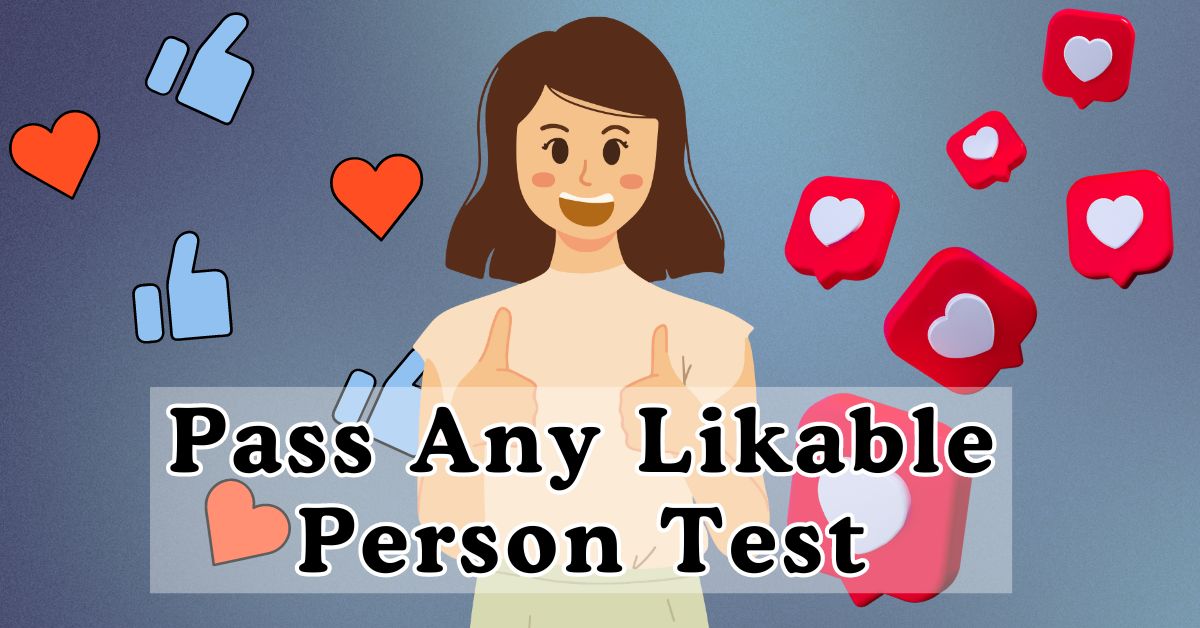In today’s interconnected world, being likable is often the key to building strong relationships—whether in personal or professional settings. One way to assess this important trait is through a likable person test. This test evaluates various aspects of your personality to determine how others perceive you. While no one can be universally loved, there are certain traits and behaviors that consistently make individuals more likable. In this article, we’ll explore what a likable person test is, the key traits that determine likability, and how you can enhance your social skills to make a positive impact in your interactions.
What Is a Likable Person Test? Understanding the Basics
A likable person test is a personality evaluation designed to measure how well you connect with others and the traits that contribute to your likability. These tests typically assess various qualities such as empathy, communication skills, openness, and charisma. The aim is to help individuals understand how they are perceived by others and identify areas for personal growth.
Many likable person tests are available online, allowing people to take quizzes or surveys to gauge how likable they are based on responses to hypothetical situations or self-assessment questions. The results usually offer insights into your social strengths and weaknesses, providing guidance on how to improve in areas that may affect your likability.
Whether you’re interested in boosting your personal relationships, networking skills, or professional interactions, taking a likable person test can give you valuable feedback that helps you become a more socially engaging individual.
How to Know If You’re Likable: Key Personality Traits
How do you know if you’re likable? It’s not just about being nice. There are several core personality traits that determine how likable someone is. While some traits come naturally to certain individuals, others can be learned and improved over time. Here are some of the key traits that a likable person test might evaluate:
- Empathy:
Likable people are able to put themselves in others’ shoes, understanding how others feel and offering support. Being empathetic allows you to connect on a deeper level, which is crucial for likability. - Active Listening:
People who are good listeners often score higher on likability scales. When you give others your full attention, it shows that you value their thoughts and opinions, making you more approachable. - Positivity:
Likable individuals tend to maintain a positive attitude, even in difficult situations. This trait draws people in, as they prefer to be around those who can lift their spirits and create a positive atmosphere. - Authenticity:
Being genuine and true to yourself is one of the most important characteristics of a likable person. Authentic people don’t put on a façade or try too hard to impress others—they’re comfortable in their own skin, and that attracts others. - Open-Mindedness:
Likable individuals are open to different perspectives and ideas. They respect diversity and are willing to engage in discussions with people who have different viewpoints, which makes them easier to approach and connect with.
By embodying these traits, you’ll likely score high on a likable person test and create lasting, positive impressions in your interactions.
Top Characteristics of a Likable Person According to Psychology
Psychologists have long studied the qualities that make someone likable. While every person is different, there are some universally agreed-upon traits that consistently contribute to higher likability. According to research, here are the top characteristics of a likable person:
- Humor and Playfulness:
A sense of humor can break the ice and make people feel more at ease. Likable people know how to use humor appropriately to lighten the mood and engage others in a fun way. - Emotional Intelligence (EQ):
High emotional intelligence is key to being likable. Those with strong EQ can read emotional cues, respond with empathy, and manage their own emotions in social situations, which helps foster deeper connections. - Gratitude:
Expressing gratitude shows appreciation for the people in your life. Likable individuals regularly express thanks, making others feel valued and important. - Confidence Without Arrogance:
Confidence is attractive, but it’s important to strike a balance. Likable people exude quiet confidence—they believe in themselves without belittling others or coming across as arrogant. - Flexibility and Adaptability:
Being flexible and open to change makes you easier to work with and talk to. Likable individuals adapt to different situations and are willing to compromise, which enhances their social appeal.
These characteristics are the foundation of likability, and many personality tests for likability are designed to assess these traits. By recognizing and nurturing them, you can improve your overall social likability.
How to Improve Social Likability: Tips for Passing Any Test
Even if you don’t naturally possess all the traits of a likable person, the good news is that likability can be improved. If you’re preparing to take a likable person test or simply want to become more likable in your daily life, here are some tips to help you improve:
- Smile More:
Smiling is a universal sign of friendliness. It puts others at ease and makes you appear approachable. Practice smiling more in your interactions to enhance your likability. - Practice Active Listening:
Make a conscious effort to truly listen when someone is speaking. Show that you’re engaged by nodding, making eye contact, and asking thoughtful follow-up questions. - Be Positive:
Focus on bringing a positive attitude into conversations. Complaining or being overly negative can turn people off, while maintaining optimism can make you a person others want to be around. - Develop Your Emotional Intelligence:
Improve your emotional intelligence by becoming more aware of your own feelings and learning how to manage them effectively. This will help you respond more thoughtfully in social situations. - Engage in Small Acts of Kindness:
Small gestures, like offering help or giving compliments, can go a long way in making you more likable. These acts show that you care about others, making them more likely to connect with you.
By implementing these strategies, you’ll be better prepared to pass any likable person test and improve your relationships in both personal and professional settings.
Why Taking a Likable Person Test Can Help You Improve Relationships
Taking a likable person test isn’t just about satisfying your curiosity—it’s a tool that can significantly improve your relationships. Here’s why:
- Self-Awareness:
Understanding how others perceive you is the first step toward improving your social interactions. A likable person quiz provides feedback on areas where you may need to improve, such as communication or empathy. - Targeted Personal Development:
Based on your results, you can focus on developing specific traits that contribute to likability, such as becoming a better listener or being more open-minded. This targeted approach makes self-improvement more effective. - Improving Professional Relationships:
In the workplace, being likable can help you build stronger professional networks, enhance teamwork, and make a positive impression on colleagues and supervisors. - Boosting Personal Connections:
In your personal life, higher likability can lead to deeper, more meaningful relationships with friends, family, and partners. It can also improve your dating life, as likability is a key factor in forming romantic connections.
By taking a likable person test, you gain valuable insights into how to strengthen your relationships across all areas of life.
Top Personality Tests to Measure Your Likability
If you’re curious to know how likable you are, there are several personality tests available that measure your likability. Here are some popular ones:
- Likability Test by Psychology Today:
This comprehensive test evaluates various traits like empathy, communication skills, and authenticity to determine how likable you are. - The Likable Person Quiz by BuzzFeed:
A more lighthearted quiz, this one assesses fun aspects of your personality to gauge how likable you are in casual social settings. - Myers-Briggs Type Indicator (MBTI):
While not specifically a likability test, the MBTI can give you insights into your personality type and how your traits affect your social interactions. - The Enneagram Personality Test:
This test dives deeper into your core motivations and fears, helping you understand how these factors influence your relationships and likability.
By taking these tests, you can gain a clearer picture of your social strengths and areas for improvement.
For more exciting blogs, visit our homepage Magzineco.
Conclusion: Why the Likable Person Test Can Help You Build Stronger Connections
Taking a likable person test isn’t just a fun activity—it’s a powerful tool for personal growth. By understanding your social strengths and identifying areas for improvement, you can become more likable and foster stronger, more meaningful connections. Whether it’s improving your personal relationships or enhancing your professional interactions, being more likable has far-reaching benefits in all areas of life. By focusing on empathy, positivity, and authenticity, you can pass any likable person test with flying colors and enjoy the rewards that come with being someone people naturally gravitate towards.
FAQs About the Likable Person Test
- What is a likable person test?
A likable person test evaluates various traits like empathy, communication, and openness to determine how likable you are. - How can I improve my likability?
You can improve your likability by practicing active listening, being more positive, developing emotional intelligence, and showing genuine interest in others. - What personality traits are measured in a likable person test?
Traits such as empathy, authenticity, humor, positivity, and communication skills are often measured in a likable person quiz. - Can a likable person test help in professional settings?
Yes, likability can enhance your professional relationships, making you more approachable and easier to work with, which can benefit your career. - Are online likable person quizzes reliable?
While online quizzes provide insights, they are not definitive. For more accurate results, consider taking more comprehensive psychological assessments. - What is the psychology behind likability?
Likability is often influenced by traits such as empathy, emotional intelligence, trustworthiness, and humor, all of which foster positive social interactions. - How does emotional intelligence affect likability?
High emotional intelligence helps you understand and manage your own emotions, as well as empathize with others, making you more likable. - Can introverts be likable?
Absolutely. Likability is not about being extroverted but about how well you connect with others, which introverts can excel at through empathy and thoughtful communication. - Does being likable help in relationships?
Yes, likable people tend to build stronger and more meaningful personal relationships because they make others feel valued and appreciated. - How can I measure my likability?
You can measure your likability by taking a likable person test or by reflecting on how others respond to you in social situations.




